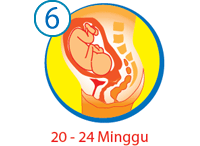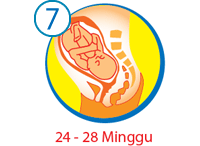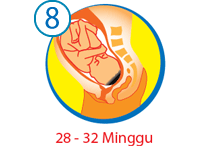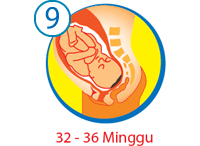Prenatal development: the embryonic and fetal growth process

- 0 to 4 weeks
- Initiastage: formative period for brain, nervous system, and facial features
- Height: Approx. 2cm

- 4 to 8 weeks
- Heart begins to beat
- Height: Approx. 3cm
Weight: Approx. 30g

- 8 to 12 weeks
- Major organs form and begin to function
- Height: Approx. 7cm
Weight: Approx. 30g

- 12 to 16 weeks
- Heart beat can be heard by ultrasound
- Height: Approx. 20cm
Weight: Approx. 170g

- 16 to 20 weeks
- Baby’s body begins to move
- Height: Approx. 25cm
Weight: Approx. 450g

- 20 to 24 weeks
- Development of genitalia
- Height: Approx. 33cm
Weight: Approx. 675g

- 24 to 28 weeks
- Hair lengthens, eyes start to open
- Height: Approx. 37cm
Weight: Approx. 1300g

- 28 to 32 weeks
- Baby starts to respond to large sounds
- Height: Approx. 42cm
Weight: Approx. 2200g

- 32 to 36 weeks
- Head begins to gravitate to birthing position
- Height: Approx. 45cm
Weight: Approx. 3200g
Bleeding after childbirth
Normal postpartum bleeding, called lochia, is up to 500cc for vaginal birth and up to 1000cc for cesarean birth. Blood loss over those levels is considered postpartum hemorrhaging and is the most common cause of death after childbirth.
- Postpartum bleeding is categorized as follows:
- 1:Initial bleeding: in the first 24 hours after childbirth
- 2:Initial birth: for up to 6 weeks after childbirth
Excessive postpartum bleeding can cause the mother to go into shock.Shock levels experience due to postpartum bleeding are as follows:
| Amount of blood loss | Blood pressure | Symptoms | Severity |
|---|---|---|---|
| 500-1000ml (10-15%) |
Normal | Palpitations dizziness |
Light |
| 1000-1500ml (15-20%) |
Slightly low 80~100mmHg |
Fatigue palpitations sweating |
Low |
| 1500-2000ml (20-35%) |
Low 70~80mmHg |
Neurological disorder facial pallor abnormal urine |
Medium |
| 2000-3000ml (35-50%) |
Extremely low 50~70mmHg |
Fainting black out breathing difficulty inability to urinate |
High |
Information about maternity napkins
- Provide comfort and security for the new mother after birth.
- Provide different functions than those of normal sanitary/menstrual napkins.
- The amount and property of postpartum blood differs from that of menstrual blood.
- Postpartum blood, called lochia, contains liquid membranes, red and white blood cells, uterine mucus, fetal waste, etc.
Dacco maternity napkins are specially designed to absorb lochia, the postpartum bleeding that lasts up to 6 weeks. A new mother can rest assured, knowing that the soft, hygienic and safe materials used in dacco maternity napkins will treat her tender skin with the utmost care.